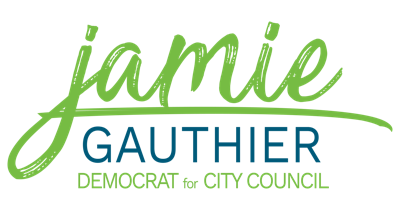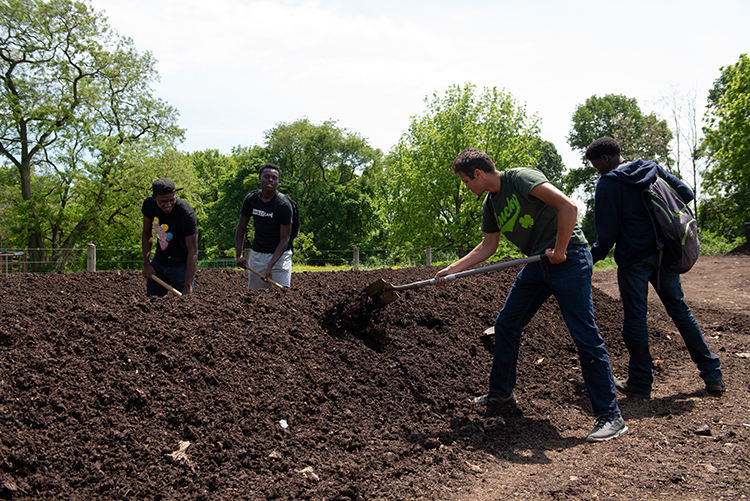by Jillian Baxter
On April 24th, PennFuture and the Clean Air Council co-sponsored an environmental forum for City Council At-Large candidates at the Academy of Natural Sciences of Drexel University. With over 30 candidates running for Philadelphia’s seven at-large seats, following the policy goals of each is a daunting task. The forum was meant to show voters which candidates prioritize the many environmental issues that threaten the city. Only six candidates attended the forum- Ogbonna Hagins, Justin Diberardinis, Drew Murray, Adrian Riviera-Reyes, Joe Cox, and Beth Finn.
Here’s what they talked about.
Litter and Recycling
Litter is always a hot button issue. Center City neighborhoods, blessed with hundreds of BigBelly trash cans, fare much better than the many neighborhoods without the city-installed pubic trash cans. In these neighborhoods, trash lines the streets, attracts unwanted bugs and rodents, clogs the storm drains, and eventually contaminates city water.
Every candidate present at the forum had ideas about how to improve Philadelphia’s littering problem. Adrian Riviera-Reyes emphasized the need for consistent trash pickup and street sweeping, Joe Cox and Beth Finn both championed the installation of city trash cans in every neighborhood, and Ogbonna Hagins talked about eliminating trash limits at sanitation convenience centers to prevent illegal dumping.
Philadelphia’s trash-incineration debacle was also brought up during the forum. Since it has become increasingly expensive for Philadelphia to properly dispose of its recyclables, the city had been sending half of its recyclable material to be incinerated at a waste-to-energy plant. The other half was going to Philadelphia’s Waste Management, where it is properly recycled. However, recyclable items that are mixed with food residue, water, or non-recyclable items are considered contaminated and disposed of as trash.
To improve Philadelphia’s recycling, every candidate expressed support for comprehensive educational programs that would teach city residents how to properly recycle. This would reduce the amount of contaminated recyclable material that comes to the plant and maximize the amount of material recycled. Along with increased education, each candidate expressed support for building a recycling plant in the city because, in addition to creating jobs, a local plant would further ensure that the city’s recyclable material is recycled.
Renewable Energy
In 2017, Mayor Kenney committed to transitioning the city to 100-percent renewable energy by 2035 in an effort to reduce the air, water and land pollution that comes from burning fossil fuels. In order to meet this goal, city government must concentrate on simultaneously increasing the efficiency of the city’s buildings while changing the ways in which it powers them because buildings, not cars, are responsible for the majority of carbon pollution in the city.
Beth Finn said she would push PECO and Philadelphia Gas Works to transition to 100-percent renewable energy in the next ten years. Adrian Riviera-Reyes agreed with Beth adding that he would sanction PECO and Philadelphia Gas Works if they do not transition to renewable energy, while also making green infrastructure a priority in the budget. Justin DiBerardinis made an impassioned speech stressing that Philadelphia’s sustainability goals should be consistent with its business interests, citing hypocrisy in Philadelphia’s renewable energy goals as the city simultaneously approves the construction of a liquified natural gas facility in Passyunk. Joe Cox questioned why city government has waited so long to set these goals, stating that every building should already have solar panels, that the city should be looking into harnessing its wind for power, and that the city should look to Lincoln Financial Field as a model for future renewable infrastructure.
Philadelphia’s Green New Deal
Modelled after the Federal Green New Deal proposed by Rep. Alexandria Ocasio-Cortez, the Philadelphia Green New Deal is a local economic stimulus package that would use tax dollars to fund projects to transition the city from fossil fuels to renewable energy, more efficient buildings and less pollution. The deal would also support economic justice to the city, as these projects would mollify the environmental issues that unfairly impact low-income Philadelphia communities, as well as bring jobs and other money-making opportunities.
To implement Philadelphia’s Green New Deal, Ogbonna Hagins said that he would begin by initiating policies that ban single-use plastics, as well as policies that discourage city residents from throwing away usable, salvageable goods. Joe Cox said he would concentrate on making Philadelphia safer for cyclists and therefore reducing the number of cars on the road.. Measures he would support include adding more bike lanes, fixing potholes, and enforcing bike safety laws. Beth Finn’s plan, in addition to pushing for a full transition to renewable energy and banning single-use plastics, includes adding more green space like parks and rooftop gardens. Justin Diberardinis’ plan, inspired by his current work at Bartram’s Garden, is to lay the foundation for a permanently sustainably-minded Philadelphia by reconnecting city residents to their natural landscapes. His current farming program at Bartram’s Garden employs over 50 people and offers fresh fruits and vegetables for a dollar apiece in a food desert. He aspires to expand this program to the entire 10,000 acre Fairmount Park system. Adrian Riviera-Reyes said that the Green New Deal has been the cornerstone of his campaign. As a platform to tackle economic injustice, racial injustice and poverty, he supports small, foundational improvements to communities beginning with enforcing consistent trash collection, banning single-use plastics, and implementing street sweeping programs, then transitioning toward renewable energy, building more efficient infrastructure, and expanding SEPTA.









